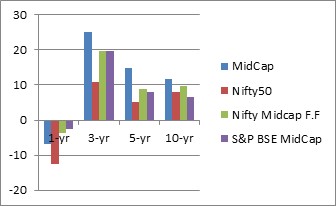Midcaps are still outshining the markets. This is evident by the last 3-year average returns, a staggering 25% as compared to large caps which delivered 12%.
But this past one year has been a blood bath for the global markets including India, where we saw large-caps stocks correcting more than midcaps.
So has the time come to invest in large-caps and avoid midcaps?
But before we decide that, let us review what makes midcaps so popular?
Midcaps are those whose market capitalization is below the top 100 stocks. Because of this, they aren’t as vastly tracked as their large cap peers.
Because of lack of information or we can call the benefit of the unknown, the intrinsic value of such stocks might be far greater than the market value, which creates a huge potential for returns. For instance, Bajaj Finance was trading at around Rs. 650 in 2012 and now after four years it is around Rs. 6,900. Jubliant Food and Eicher Motors are other such examples.
We have also noticed that these stocks are mainly owned by their promoters. Thus, FII exposure is very limited, which presents an opportunity for investors, provided they select the right stocks.
But do remember, the above stated factors also make these stocks highly volatile. If a large shareholder or investor exits the company then it creates a problem. Also, during the time of economic volatility, such as interest rate change or an economic slowdown, these companies are battered more than their large cap peers.
Also, midcaps often have a higher debt/equity ratio as compared to large caps, which can hurt them in the long run if it is not properly managed.
Vidya Bala, Head of Mutual Funds Research, Fundsindia.com, says “Large-cap companies are known for stable returns, dividend, etc. because of which their valuations are always at premium and at times not in line with their earnings. This is one of the reasons why market corrections affect them more. This, in turn helps bring the prices back to attractive rates.”
But she adds that this doesn’t mean investors should stay away from midcaps. “Large-caps form the core of one’s portfolio and midcaps should be used to get the return kicker. Only risk averse should avoid midcaps.”
Historical fund performance of mid cap funds versus Nifty, Nifty Midcap & S&P BSE Midcap

Data source: Value research as on 7th April 2016
Historically, midcaps perform better than large-caps due to the higher return potential characteristics. But that doesn’t mean one should just invest only in midcaps. Instead, Soumendra Nath Lahiri, CIO, L&T Mutual Fund, says, “70% should be for large-caps while 30% should be allocated for midcaps. One should focus on investing in good companies. Over a long period of time midcaps may provide better returns.”
To sum up, experts say that investors should diversify their portfolio by having at least 70% of their corpus in large caps and the remaining in mid-caps.



